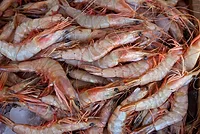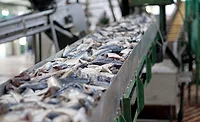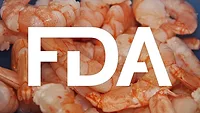AFFI Responds to Officials Linking COVID-19 to Imported Seafood

As reports of a second wave of coronavirus emerge in Beijing, China, the American Frozen Food Institute (AFFI) has released a statement in response to speculation that this round of SARS-CoV-2 illnesses may be linked to imported seafood in China.
AFFI says that officials are suggesting that the virus was present on chopping boards used to cut imported salmon from Norway.
“It could be contaminated seafood or meat,” says Yang Peng, a member of the coronary pneumonia outbreak prevention group at Beijing’s Center for Disease Control.
However, AFFI says it is a “misleading conclusion” that frozen foods can contribute to the spread of coronavirus.
Despite reports that the virus was detected on a cutting board at a Beijing wholesale food market, supplies of the salmon—and other foods at the market—tested negative for the virus. This prompts the possibility that an infected worker was the source of the contamination.
“The overwhelming scientific consensus is that SARS-CoV-2, unlike norovirus and hepatitis A, is not transmitted by the consumption of potentially contaminated foods. The virus is unlikely to be in food, but even if it were, SARS-CoV-2 is transmitted by respiratory, not gastrointestinal routes,” says former NoroCORE™ scientific director and top food virologist Dr. Lee-Ann Jaykus. ”While we do freeze viruses to store them, there is no science that points to the link between surface contamination of food and the contraction of COVID-19.”
“While SARS-CoV-2 has been recovered from surfaces, particularly those in health care settings, the risk of contracting COVID-19 from these surfaces is likely quite low. This is especially the case when food handlers use proper sanitation and hand hygiene,” says AFFI food safety expert Dr. Donna Garren.
In addition, AFFI also states:
- The U.S. food supply remains among the safest in the world. There is no evidence for the spread of SARS-CoV-2 through consumption of food or no known cases of foodborne COVID-19. According to multiple public health agencies around the world, including the U.S. Department of Agriculture, U.S. Food and Drug Administration, U.S. Centers for Disease Control and Prevention, World Health Organization, and European Food Safety Authority, coronaviruses are primarily spread from person-to-person through respiratory droplets and aerosols.
- While many viruses can survive freezing temperatures, SARS-CoV-2 does not cause foodborne illness. Like other viruses, surfaces can become contaminated with SARS-CoV-2 by contact with an infected person. To counteract this possibility, a two-pronged control approach is used: frequent and proper hand washing, and surface disinfection. These measures are recommended by the CDC and remain important steps to prevent exposure.
- The frozen food industry’s top priority today and every day is food safety. As a preventative measure, frozen food companies are increasing the rigor of their sanitation and hygiene practices and instituting many other strategies to prevent disease transmission amongst their essential workforce. These measures are beyond what is required by law or regulatory guidance during this pandemic.
Looking for quick answers on food safety topics?
Try Ask FSM, our new smart AI search tool.
Ask FSM →








